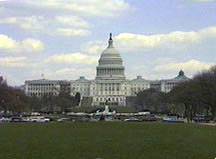Let The Debate Begin! Transportation Committee Leaders Say Comprehensive FAA Reauthorization Provides Transformational Aviation Reform
Transportation and Infrastructure Committee Chairman Bill Shuster (R-PA) and Aviation Subcommittee Chairman Frank LoBiondo (R-NJ) today introduced the Aviation Innovation, Reform, and Reauthorization (AIRR) Act, legislation that establishes an independent, not-for-profit corporation, outside of the federal government, to modernize and provide U.S. air traffic control (ATC) services.

The AIRR Act (H.R. 4441) is a six-year reauthorization of the FAA, and maintains the FAA’s role as the Nation’s aviation safety regulator. The federally chartered air traffic control corporation will be governed by a board representing the aviation system’s users and the public interest. The comprehensive reauthorization bill also streamlines the FAA’s aviation equipment and aircraft certification processes, provides additional consumer protections, addresses aviation safety issues, gives the FAA more tools for the safe integration of unmanned aircraft systems, and provides for airport infrastructure improvements across the country.
“The United States has led the world in aviation since pioneering this modern mode of transportation. We have the safest system in the world, and we will continue to do so under this bill,” Shuster (pictured, left) said. “But our system is incredibly inefficient, and it will only get worse as passenger levels grow and as the FAA falls further behind in modernizing the system. Furthermore, the FAA’s overly bureaucratic certification processes are handicapping American companies and causing us to fall behind our competition. The AIRR Act is transformational legislation that prepares the U.S. aviation system for the future, helps ensure a modern, safe system that benefits passengers and the economy, and keeps America competitive in a vital industry.”

“While the U.S. continues to have the safest aviation system in the world, it is clear we do not have the most efficient or effective system for future growth,” LoBiondo (pictured, right) said. “I commend Chairman Shuster for his willingness to engage and openness to ideas not only from members of the Committee, but from stakeholders across the industry to modernize and transform our aviation system to meet 21st century demands. We remain committed to moving forward with the AIRR Act, listening to and incorporating additional ideas from our colleagues and stakeholders that will strengthen our aviation system.”
Shuster added, “This majority of this bill was developed in the same bipartisan manner as previous committee bills. There have been genuine policy differences, and Committee Members we will have the opportunity to further discuss the legislation at a hearing next week and offer amendments during the markup process.”
The current authorization of the FAA and aviation programs expires at the end of March. For the past two years, Chairman Shuster and the Committee have held numerous meetings, listening sessions, roundtables, and hearings to gather input and ideas from transportation officials, stakeholders, and policy experts in developing the AIRR Act.

The legislation recognizes that maintaining the status quo will result in more setbacks and soaring costs of failed federal ATC modernization efforts, a bureaucracy that continues to stifle American innovation, and a system that is incapable of handling growing demand.
Establishing an independent ATC provider has become the standard across the world, and the United States is one of the last industrialized nations yet to do so. Countries that have done so have consistently benefited from safety levels that have been maintained or improved, successful modernization of their ATC systems, improved ATC services, and generally lower ATC service costs. The AIRR Act seeks to move U.S. aviation into the modern era and beyond.
(Source: House Transportation Committee News Release. Images from file and from information provided by the committee)
 TikToker Arrested After Landing His C182 in Antarctica
TikToker Arrested After Landing His C182 in Antarctica Classic Aero-TV: Versatile AND Practical - The All-Seeing Aeroprakt A-22 LSA
Classic Aero-TV: Versatile AND Practical - The All-Seeing Aeroprakt A-22 LSA ANN's Daily Aero-Term (06.27.25): Hazardous Weather Information
ANN's Daily Aero-Term (06.27.25): Hazardous Weather Information ANN's Daily Aero-Linx (06.27.25)
ANN's Daily Aero-Linx (06.27.25) Aero-News: Quote of the Day (06.27.25)
Aero-News: Quote of the Day (06.27.25)





